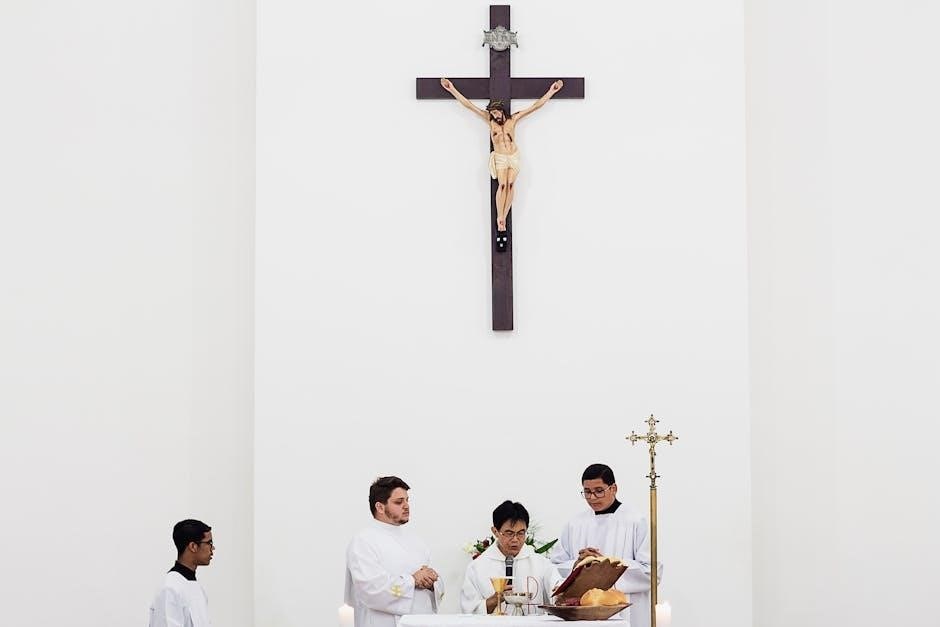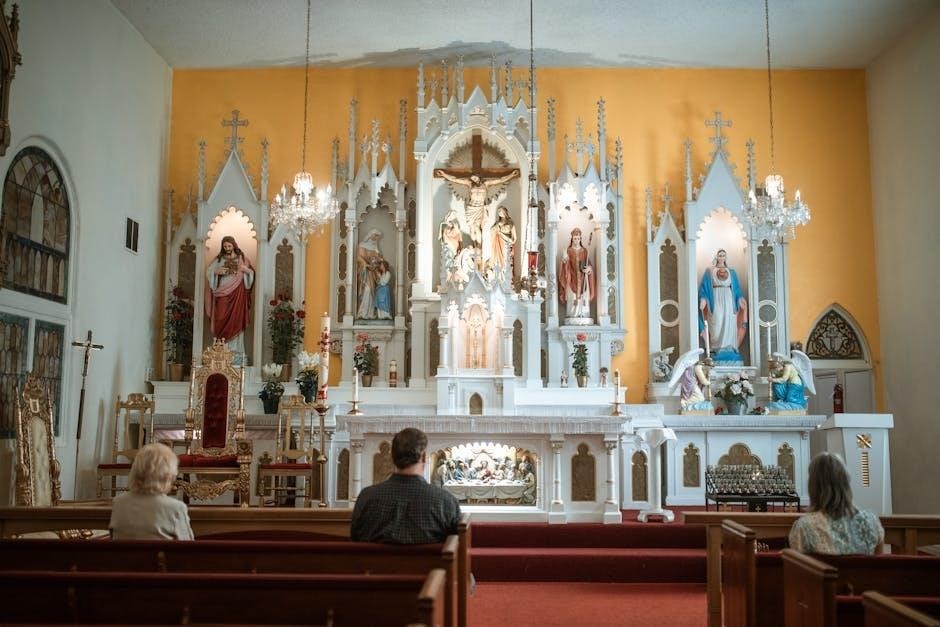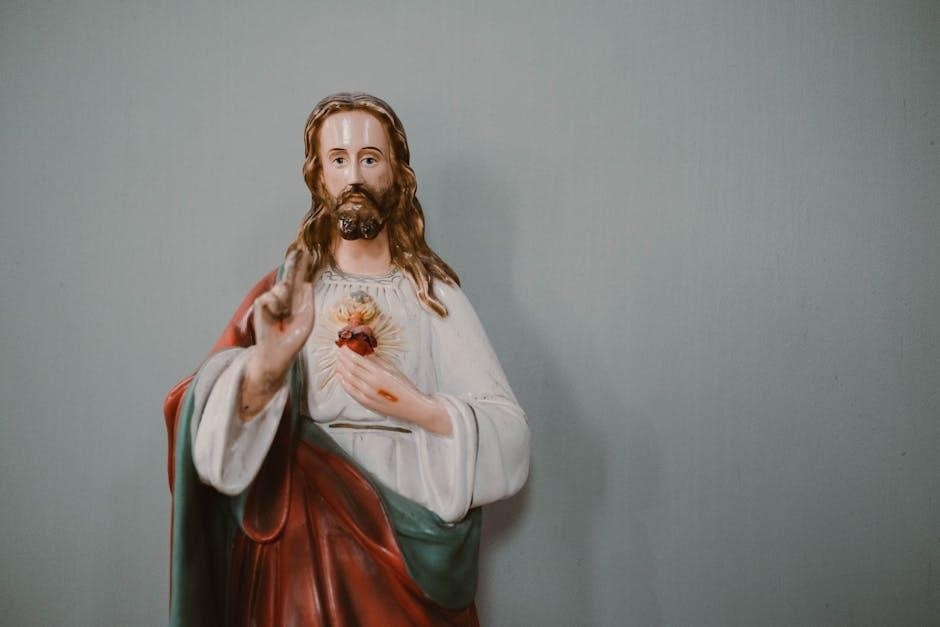The Catholic Church has seven sacraments, including Baptism and Eucharist, which are instituted by Christ and entrusted to the Church, dispensing divine life to believers through efficacious signs of grace.
Overview of the Sacraments
The sacraments are a fundamental part of the Catholic Church, and understanding their significance is crucial for believers. According to the Church, the sacraments are efficacious signs of grace, instituted by Christ and entrusted to the Church, by which divine life is dispensed to us. The seven sacraments are categorized into three groups: sacraments of initiation, sacraments of healing, and sacraments of vocation. Each sacrament has its own unique characteristics and requirements, and they are all essential for the spiritual growth and development of Catholics. The sacraments are also a means of expressing and deepening one’s faith, and they play a vital role in the life of the Church. By participating in the sacraments, believers can experience the love and mercy of God, and they can grow in their relationship with Him. The sacraments are a treasure of the Church, and they continue to inspire and guide believers to this day.

The Seven Sacraments
The seven sacraments include Baptism, Eucharist, and Confirmation, which are sacraments of initiation, and are essential for Catholic faith and practice, guiding believers on their spiritual journey always.
Sacraments of the Living
The sacraments of the living are a group of sacraments that are received by those who are in a state of grace and are living a virtuous life. These sacraments include Confirmation, Eucharist, Anointing of the sick, Holy Orders, and Matrimony. They are called sacraments of the living because their chief purpose is to nourish and sustain the spiritual life of believers. The sacraments of the living are essential for the spiritual growth and development of Catholics, and are a vital part of their faith journey. The Church teaches that these sacraments are necessary for salvation, and that they provide the grace and support needed to live a life of holiness and service to others. By receiving these sacraments, Catholics are able to deepen their relationship with God and live out their faith in a more meaningful way.

Preparation for the Sacraments
Preparation involves spiritual guidance, prayer, and self-reflection to receive sacraments with proper disposition and intent always.
Minimum Requirements
To receive the sacraments, individuals must meet certain minimum requirements, including being free from mortal sin and having a proper understanding of the sacrament. This involves spiritual preparation and a willingness to receive the sacrament with an open heart. The Catholic Church provides guidance on these requirements, emphasizing the importance of a well-formed conscience and a commitment to living a virtuous life. By meeting these minimum requirements, individuals can receive the sacraments in a state of grace, allowing them to fully participate in the sacramental life of the Church. The Church’s teachings on the minimum requirements for receiving the sacraments are outlined in various documents, including the Catechism of the Catholic Church, which provides a comprehensive guide to the sacraments and their reception.

The Catholic Church and the Sacraments
The Church plays a vital role in administering sacraments, guiding believers.
Role of the Church
The Church has a significant role in the administration of the sacraments, as it is the institution entrusted by Christ to dispense divine life to believers. The Church provides guidance and support to believers as they prepare to receive the sacraments, and its clergy play a vital role in administering the sacraments. The Church also provides a community for believers to worship and grow in their faith, and its teachings and traditions help to shape the understanding and practice of the sacraments. Through its sacramental ministry, the Church helps to bring people closer to God and to each other, and to build up the body of Christ. The Church’s role in the sacraments is essential to the spiritual life of believers, and it is a key part of the Church’s mission to spread the Gospel and to bring people to salvation. The Church’s sacramental ministry is a treasure that has been passed down through the centuries.

Availability of Information on the Sacraments
Information on sacraments is available online as digital books and documents for free download and reading purposes instantly.
Online Resources
There are numerous online resources available for learning about the sacraments, including digital books and documents that can be downloaded for free. These resources provide a wealth of information on the sacraments, including their history, significance, and practices. Many websites offer online versions of books and documents that were previously only available in print. These online resources make it easy for people to access information on the sacraments from anywhere in the world. Some websites also offer downloadable PDF files, which can be saved and read offline. Additionally, online archives of historical documents and books provide valuable insights into the development of the sacraments over time. Overall, online resources have made it easier for people to learn about and understand the sacraments, and have helped to increase access to this important information. Online resources are convenient and easily accessible.
The seven sacraments are a cornerstone of Catholic faith, guiding believers towards spiritual growth and enlightenment through sacred rituals and practices instituted by Christ and the Church online.
Importance of the Sacraments
The sacraments are essential to the Catholic faith, playing a vital role in the spiritual journey of believers, as they provide a means of encountering God’s love and mercy, and of deepening one’s relationship with Christ and the Church, through the administration of sacred rites and rituals, such as Baptism, Eucharist, and Confirmation, which are instituted by Christ and entrusted to the Church, dispensing divine life to believers, and guiding them towards spiritual growth and enlightenment, and ultimately, towards salvation, by facilitating a personal encounter with God, and by providing a sense of community and belonging among believers, who come together to celebrate and participate in the sacraments, which are a cornerstone of Catholic worship and devotion, and are considered necessary for salvation, as they provide the means by which believers can receive God’s grace and forgiveness, and can grow in their faith and love for God.
